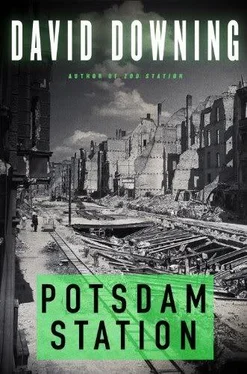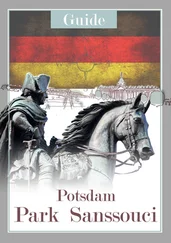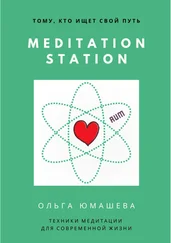David Downing - Potsdam Station
Здесь есть возможность читать онлайн «David Downing - Potsdam Station» весь текст электронной книги совершенно бесплатно (целиком полную версию без сокращений). В некоторых случаях можно слушать аудио, скачать через торрент в формате fb2 и присутствует краткое содержание. Жанр: Шпионский детектив, на английском языке. Описание произведения, (предисловие) а так же отзывы посетителей доступны на портале библиотеки ЛибКат.
- Название:Potsdam Station
- Автор:
- Жанр:
- Год:неизвестен
- ISBN:нет данных
- Рейтинг книги:5 / 5. Голосов: 1
-
Избранное:Добавить в избранное
- Отзывы:
-
Ваша оценка:
- 100
- 1
- 2
- 3
- 4
- 5
Potsdam Station: краткое содержание, описание и аннотация
Предлагаем к чтению аннотацию, описание, краткое содержание или предисловие (зависит от того, что написал сам автор книги «Potsdam Station»). Если вы не нашли необходимую информацию о книге — напишите в комментариях, мы постараемся отыскать её.
Potsdam Station — читать онлайн бесплатно полную книгу (весь текст) целиком
Ниже представлен текст книги, разбитый по страницам. Система сохранения места последней прочитанной страницы, позволяет с удобством читать онлайн бесплатно книгу «Potsdam Station», без необходимости каждый раз заново искать на чём Вы остановились. Поставьте закладку, и сможете в любой момент перейти на страницу, на которой закончили чтение.
Интервал:
Закладка:
Still, there was food enough, and old acquaintances to pass the time with. Not everyone had died. Not yet.
The Hitlerjugend held his watch up to the kerosene lamp. 'It's after nine,' he told Effi.
She'd lost track of the time, something easy to do in what smelt and felt like the bowels of the earth. She could no longer hear or see the war, but the constant turnover of casualties was proof enough of its continuance. The smell of fresh blood had been with her all day.
The shift had lasted twelve hours. She was working as a nursing assistant, her uniform a bloodstained apron, her tasks mostly menial – fetching and carrying, boiling instruments, cleaning what had to be cleaned with water collected from the pumps outside. Her only close contact with patients lay in bandaging the wounded and trying to comfort the dying.
Rosa had been with her throughout, sometimes helping but mostly just drawing. Effi had no idea what mental and emotional havoc was being wreaked on the already traumatised seven-year-old, but she didn't dare let her out of her sight. She told herself that watching people so intent on saving life must surely have a positive effect, but she didn't really believe it.
The girl seemed okay. They'd just shared a can of sardines and some bread in the room which passed for a hospital staff room, and were sitting at their table, listening to the moans of the wounded next door. The hospital was running out of morphine, and only those in excruciating pain were getting any. Some of the unlucky ones were stoical beyond belief, but most found it easier to groan or scream. Effi had hardly noticed while she was working, but now it made her want to join in.
Annaliese Huiskes sat down beside them. She had somehow got hold of a hot cup of tea, which she offered to share. 'I'm sorry about earlier,' she told Effi in a low voice.
'Don't worry about it,' Effi told her. 'You made a brilliant recovery.' Annaliese had let Effi's real name slip, but answered the questioning looks with an explanation of staggering simplicity. Dagmar had been given that nick-name, Annaliese explained, because she looked so much like the film star Effi Koenen.
'The traitor,' one doctor had murmured. Another had denied the resemblance.
'I've been meaning to ask you,' Effi said, gesturing at the ringed finger. 'Did you get married?'
A shadow passed over the other woman's face. 'A corpse marriage,' she said. 'I shouldn't call it that – I hate it when other people use that phrase. But it's more than three years ago. Maybe you'd disappeared by then, but there was a Fuhrer decree allowing women who'd just lost their fiancees to marry them post-mortem. There was a pension included, and that's why I went for it, but I did love Gerd, and I'm sure he'd have seen the funny side of it – marrying me when he was already dead.' She smiled to herself. 'After the war I'll find a real husband. Or try to. I suppose there'll be a shortage of men, and I'm not exactly young any more. What about you? What happened to John?'
'Who's John?' Rosa asked.
'He was my boyfriend. He went away to Sweden, and I hope he'll be back when all this is over.'
'Why shouldn't he be?' Annaliese asked.
'Three and a half years is a long time.'
Annaliese made a face. 'He was crazy about you. I only met him once, but that much was obvious.'
'He was then. But if you're not young any more, what does that make me?' Effi lowered a voice to a whisper. 'Do you know you're the first person who's recognised me in three years?'
'You look different, but your eyes are the same. And you don't look old. I think we'll both look pretty good once we've had some decent food and slept through the night a few times. How about your career? Are you going back to it?'
Effi shrugged. 'Who knows? There aren't many parts for women in their forties.'
Rosa had been paying attention. 'Were you an actress?' she asked in a whisper.
'I was,' Effi admitted. 'Quite a good one.'
After his trip out to Wedding, Russell had felt physically and emotionally exhausted. Lying down for a few hours had given his body some rest, but his brain was too busy contemplating Effi's possible fate for sleep to take over. He had to do something, had to keep on the move. He decided he would go back to Schmargendorf and confront Jens. That evening, after dark.
Once the last hint of light had disappeared from the cracks in the booking hall ceiling, he made his way down to the tunnel. A different comrade was on guard, and saw no problem in Russell seeing his boss. He found Leissner in his office, head bent over a ledger. When the men from Moscow arrived they would all be up-to-date.
The Reichsbahn man greeted Russell with a glimmer of a smile, and raised no objections to another foray. He had realised – or been told – that Varennikov was the one who mattered. Or – perish the thought – Moscow had let it slip that Russell himself was far from indispensable.
Maybe he was being paranoid. Leissner was friendly enough, and seemed more than happy to give him a run-down of the current military situation. The Red Army had breached the Teltowkanal defence line in the south-western suburbs that morning, and were expected in Zehlendorf and Dahlem sometime tomorrow. Schmargendorf should still be safe, but only for forty-eight hours.
The U-Bahn, Leissner added, was no longer working – the tunnels were being booby-trapped to prevent the Soviets from using them. And the SS had spent the afternoon setting up lots of checkpoints, particularly in the western half of the city. Russell was unlikely to face summary execution in his Reichsbahn uniform, but now that the trains had stopped running he might be pressed into military service. It would, Leissner suggested, be advisable not to argue.
Russell thanked him, and made his way up and over the elevated tracks to the goods yard entrance. Night had now fallen, and Berlin was bathed in the grim orange glow of cloud-reflected fires. It felt like rain, which might at least put some of them out.
He walked west, keeping clear of the main thoroughfares and inching his head around corners to check what lay ahead. Twice he avoided checkpoints in this manner, carefully working his way around them. And on three other occasions he came upon those who'd not been so careful, who were now swinging from makeshift gibbets with the signatures of psychopaths pinned to their chests.
Incoming shells exploded at irregular intervals as the evening wore on, some as close as a neighbouring street, but there was no point in worrying about them. If staying alive was his goal he should have stayed in London.
By the time he reached the Biesinger house in Schmargendorf it was gone ten, and he felt like falling over. It occurred to him that he'd hardly eaten all day, which hadn't been very sensible. If he ever did find Effi, she'd be looking after him.
There were no lights visible through the uncurtained windows, but Jens had his own basement shelter, as befitted a high-ranking Party official. If he was home, he'd be ensconced down there, probably drowning the Reich's many sorrows. Russell hoped he'd be conscious enough to hear the door-knock.
He gave it a mighty series of bangs, which the Russians probably heard in Teltow, and was about to repeat the effort when he heard footsteps. As the door began to open he pushed his way through, forcing a gasp from the person inside. A woman's gasp. It was Zarah.
'What do you… who…'
'It's John,' he told her, shutting the door behind him.
'John?' she exclaimed in astonishment. What are you…'
'It's a long story.'
'I can't believe it. Come downstairs, where we can see each other.'
He followed her down to the cellar. There were camp beds against three of the walls, tables, chairs and armchairs crammed into the centre of the room.
Читать дальшеИнтервал:
Закладка:
Похожие книги на «Potsdam Station»
Представляем Вашему вниманию похожие книги на «Potsdam Station» списком для выбора. Мы отобрали схожую по названию и смыслу литературу в надежде предоставить читателям больше вариантов отыскать новые, интересные, ещё непрочитанные произведения.
Обсуждение, отзывы о книге «Potsdam Station» и просто собственные мнения читателей. Оставьте ваши комментарии, напишите, что Вы думаете о произведении, его смысле или главных героях. Укажите что конкретно понравилось, а что нет, и почему Вы так считаете.












